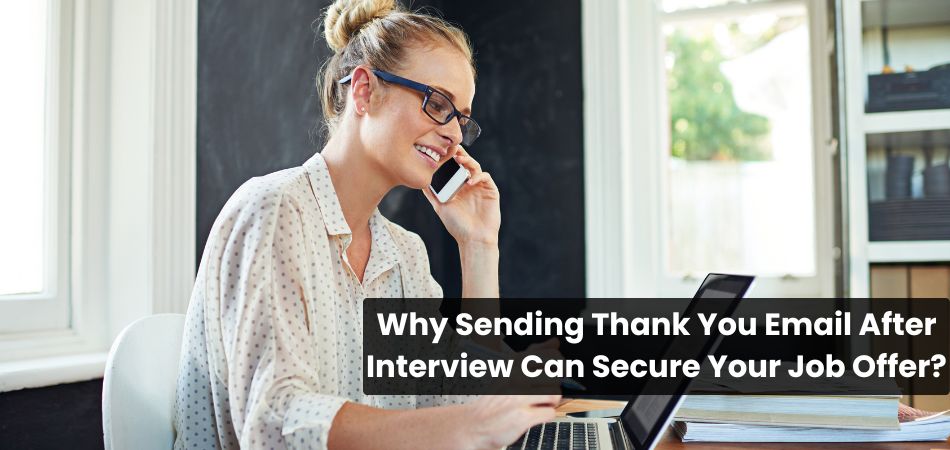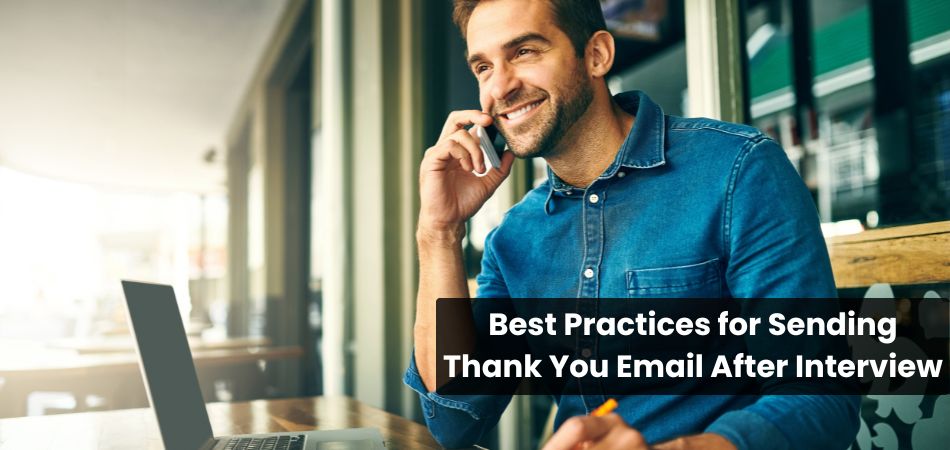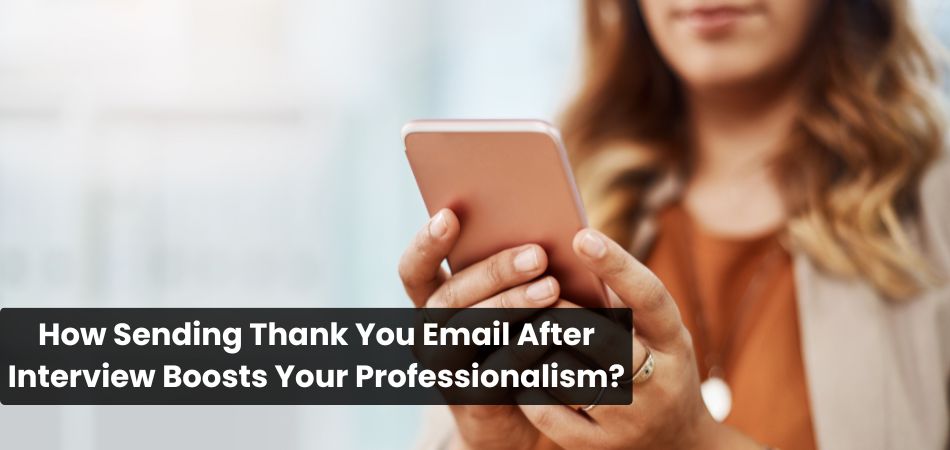An interview doesn’t end when you walk out the door—it’s just the beginning of leaving a lasting impression. In that case, following the best practices for sending thank you email after interview ensures your message is thoughtful, timely, and impactful.
Write a clear subject line, personalize each email, and keep it concise. Reiterate your skills, include a polite call to action, proofread carefully, and use a professional email address to leave a lasting impression.
Throughout this post, we’ll explore proven strategies to write a compelling thank-you email that stands out. Whether you’re new to this practice or looking to refine your approach, these tips will guide you.
Why Sending Thank You Email After Interview Can Secure Your Job Offer?
A thank-you email is more than a courtesy—it’s a strategic tool to leave a lasting impression on your interviewer. When done right, it reinforces your enthusiasm for the role and sets you apart from other candidates. Here’s how this simple gesture can significantly boost your chances of landing the job.

Reinforces Your Interest in the Position
Expressing gratitude shows that you value the opportunity and the time the interviewer spent with you. By reiterating your enthusiasm for the role, you reaffirm your genuine interest in the company. This subtle reminder helps keep you top of mind as a motivated and engaged candidate.
Highlights Key Takeaways from the Interview
A thank-you email allows you to reference specific points discussed during the interview. This demonstrates active listening and reflects your awareness of the role. Personalizing your message with these details shows that you are attentive and serious about contributing meaningfully to the company.
Demonstrates Your Professionalism and Etiquette
Timely follow-up emails reflect your acceptance of professional norms and good etiquette. Employers value candidates who take initiative and communicate effectively. Sending a well-crafted thank-you email portrays you as someone who values relationships and professionalism.
Offers a Chance to Clarify or Add Value
Sometimes, you may forget to mention important skills or achievements during the interview. A follow-up email gives you the opportunity to address these gaps. This proactive approach showcases your commitment to ensuring the employer has a complete picture of your capabilities.
Strengthens Your Connection with the Interviewer
Addressing the interviewer by name and personalizing the message builds rapport. A thoughtful email can leave a positive impression, making it easier for the interviewer to advocate for you during hiring discussions. Establishing this connection increases your chances of standing out from other applicants.
How Soon Should I Send a Thank You Email After an Interview?
Timing is crucial when sending a thank-you email after an interview. Ideally, you should aim to send it within 24 hours. This timeframe ensures that your message is timely and relevant while the conversation is still fresh in the interviewer’s mind.
Waiting too long may weaken the impact of your email. If you delay beyond a couple of days, your follow-up may seem less sincere or lose relevance altogether. A prompt thank-you email shows that you prioritize communication and are eager to stay engaged in the hiring process.
While speed is important, ensure your email is polished and free of errors. Taking the time to write a thoughtful message reflects your professionalism. Review your notes from the interview, highlight specific details, and write a concise but impactful message. A timely, well-written email reinforces your interest in the role and positions you as a strong, attentive candidate.
Best Practices for Sending Thank You Email After Interview
An effective thank-you email can make a great interview even better. Crafting a professional and personalized message demonstrates your attention to detail and interest in the role. Here are the best practices to ensure your thank-you email leaves a positive impression.

1. Use a Clear and Professional Subject Line
Start with a subject line that is simplistic and professional, such as “Thank You for the Interview” or “Appreciation for Our Conversation.” A clear subject ensures your email gets noticed and sets the tone for a positive follow-up. Avoid overly casual or vague phrases that might make your email seem unimportant. Professionalism begins with how you present your email at first glance.
2. Personalize Your Message for Each Interviewer
If you interviewed with multiple people, send individual emails specifically to each person. Reference specific points from your conversation to make the message more meaningful. Personalization shows that you paid attention and value the contributions of each interviewer. Avoid generic messages, as they can come across as insincere.
3. Keep Your Email Concise and Focused
While it’s important to express gratitude, avoid writing lengthy emails. Stick to a concise format that includes a thank-you, a reference to the discussion, and a brief reiteration of your interest in the role. Overloading the email with unnecessary details might dilute your main message. A focused email is easier for the interviewer to read and remember.
4. Reiterate How Your Skills Align with the Role
Use the email as an opportunity to reinforce your qualifications. Highlight one or two specific skills or experiences that directly address the needs discussed during the interview. This not only reminds the interviewer of your strengths but also keeps the focus on how you can add value to the team. It’s a subtle but effective way to position yourself as the ideal candidate.
5. Include a Call to Action
End your email with a polite call to action, such as inviting further discussion or asking about the next steps in the hiring process. This keeps the lines of communication open and shows that you are proactive. Avoid being overly pushy or demanding, as this can come across as aggressive. A confident yet courteous tone works best.
6. Proofread Thoroughly Before Sending
Mistakes in your thank-you email can undermine the professionalism you demonstrated during the interview. Check for spelling, grammar, and formatting errors to ensure your message is polished. Reading the email aloud can help catch awkward phrasing or missing words. A clean and error-free email reflects your attention to detail.
7. Send from a Professional Email Address
Ensure that your thank-you email comes from a professional email address that includes your name. Avoid using casual or outdated addresses that might seem unprofessional. If you are currently employed, avoid sending the email from your work account, as it can raise ethical concerns. Your email address is part of your personal brand—use it wisely.
How Sending Thank You Email After Interview Boosts Your Professionalism?
A well-crafted thank-you email isn’t just polite—it’s a reflection of your professionalism and character during the after-interview process. It demonstrates attention to detail, effective communication, and respect for the interviewer’s time. Here’s how sending a thank-you email can strengthen your professional image.

Showcases Your Ability to Follow Up
Professionals understand the importance of timely follow-ups to maintain connections. A thank-you email demonstrates that you can take initiative and close the loop on important interactions. This habit reflects a proactive approach, a skill highly valued in most work environments.
Highlights Your Thoughtfulness and Courtesy
Sending a thank-you email reflects your ability to acknowledge others’ efforts. It shows that you value the time and insights shared by the interviewer. Courtesy and respect are essential professional traits that make you stand out as a considerate team player.
Demonstrates Your Attention to Detail
A thoughtful email allows you to reiterate key points and address any specifics discussed during the interview. Taking the time to write a personalized message showcases your organizational skills. This attention to detail signals that you are thorough and committed to delivering quality work.
Reflects Strong Written Communication Skills
Professionals need to convey ideas clearly and concisely, especially in written formats. A well-written thank-you email demonstrates your ability to communicate effectively. It also gives employers confidence in your ability to handle similar tasks in the role, like client correspondence or report writing.
Leaves a Positive and Memorable Impression
A thank-you email is a small but impactful way to reinforce your image as a polished and professional candidate. It reminds the interviewer of your enthusiasm and qualifications, leaving a lasting impression. Such attention to detail helps distinguish you from other candidates who might skip this step.
Top Mistakes to Avoid When Sending Thank You Email After Interview
Your thank-you email can help solidify your candidacy, but certain mistakes can undermine it. From tone to timing, avoiding common errors is key to leaving a professional impression. Here are the top mistakes to steer clear of when crafting your follow-up email.
- Failing to Send the Email Altogether: Skipping the thank-you email entirely can make you seem disinterested or ungrateful. It’s a missed opportunity to reinforce your interest and leave a positive impression.
- Using a Generic or Template-Based Message: A thank-you email that feels impersonal or overly generic may seem insincere. Failing to customize your message for the interviewer shows a lack of effort and attention to detail.
- Sending the Email Too Late: Waiting more than 48 hours to send your thank-you email can diminish its relevance. A delayed response might signal a lack of urgency or enthusiasm for the role.
- Overloading the Email with Irrelevant Information: Including excessive details or unrelated topics can make your email unfocused and difficult to read. Stick to key points to maintain clarity and professionalism.
- Neglecting to Proofread: Typos, grammatical errors, or poor formatting can reflect poorly on your professionalism. Taking a moment to review your email ensures it’s polished and represents you well.
FAQs About Sending Thank You Email After Interview
A thank-you email is a crucial part of the interview process, but candidates often have questions about how to do it right. From timing to content, understanding the essentials can make a big difference. Here are answers to some frequently asked questions about thank-you emails.
1. Should I Send a Thank You Email After Every Interview?
Yes, it’s good practice to send a thank-you email after every interview, even for follow-up or panel interviews. It reinforces your interest and shows gratitude for the time invested in you. Each email can highlight different aspects of the discussion to keep it relevant.
2. How Long Should My Thank You Email Be?
Your thank-you email should be concise, ideally around 150-200 words. Focus on expressing gratitude, referencing key points from the interview, and reiterating your enthusiasm for the role. Avoid long-winded explanations or overloading the message with too much detail.
3. Can I Send a Thank You Email to Multiple Interviewers in One Email?
While it’s acceptable, individual emails to each interviewer are more effective. Personalized messages show that you value each person’s input and efforts. If you choose to send one email, ensure it addresses everyone and mentions specific contributions where possible.
4. What If I Don’t Have the Interviewer’s Email Address?
If you don’t have the interviewer’s email, you can ask your recruiter or the HR representative for assistance. Alternatively, you can use a company-provided contact email, if available. Always make an effort to find a professional channel for communication.
5. Is It Okay to Follow Up Again if I Don’t Receive a Response to My Thank You Email?
Yes, a polite follow-up is acceptable if you don’t hear back after your initial thank-you email. Wait at least one week before sending a follow-up to inquire about the next steps. This demonstrates initiative without appearing overly persistent.
Final Words
Sending a thoughtful thank you email after an interview is a small step that can make a big difference in how you’re perceived. By following the best practices for sending thank you email after interview, you demonstrate professionalism, gratitude, and a genuine interest in the role.
A well-crafted email not only strengthens your connection with the interviewer but also sets you apart from other candidates. Remember to personalize your message, keep it concise, and send it promptly. With these tips in mind, you can confidently leave a lasting impression and enhance your chances of landing your dream job.
